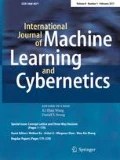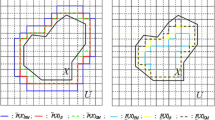Abstract
Multi-granulation rough sets and multi-scale data analysis are two active topics in granular computing. This study aims to investigate knowledge discovery in incomplete generalized multi-scale decision systems based on multi-granulation rough sets. Multi-granulation structures in incomplete generalized multi-scale decision systems are first discussed and updating mechanisms of information granules with the scale coarsening and refinement are described. Concepts of pessimistic upper and lower optimal scale combinations based on pessimistic multi-granulation rough sets are then defined and their uniqueness is verified. Evidence-theory-based numerical algorithms for finding optimal scale combinations are further designed. Notions of optimistic upper and lower optimal scale combinations based on optimistic multi-granulation rough sets are also introduced and their properties are examined. Finally, reducts of scale combinations are explored and an illustrative example is employed to elaborate multi-granulation rule acquisition approach in incomplete generalized multi-scale decision systems.
Similar content being viewed by others
References
Bao H, Wu WZ, Zheng JW, Li TJ (2021) Entropy based optimal scale combination selection for generalized multi-scale information tables. Int J Mach Learn Cybern 12:1427–1437
Bargiela A, Pedrycz W (2008) Toward a theory of granular computing for human-centred information processing. IEEE Trans Fuzzy Syst 16(2):320–330
Che XY, Mi JS, Chen DG (2018) Information fusion and numerical characterization of a multi-source information system. Knowl-Based Syst 145:121–133
Chen YS, Li JH, Li JJ, Lin RD, Chen DX (2022) A further study on optimal scale selection in dynamic multi-scale decision information systems based on sequential three-way decisions. Int J Mach Learn Cybern 13:1505–1515
Chen CLP, Zhang CY (2014) Data-intensive applications, challenges, techniques and technologies: a survey on big data. Inf Sci 275:314–347
Cheng YL, Zhang QH, Wang GY (2021) Optimal scale combination selection for multi-scale decision tables based on three-way decision. Int J Mach Learn Cybern 12:281–301
Cheng YL, Zhang QH, Wang GY, Hu BQ (2020) Optimal scale selection and attribute reduction in multi-scale decision tables based on three-way decision. Inf Sci 541:36–59
Hao C, Li JH, Fan M, Liu WQ, Tsang ECC (2017) Optimal scale selection in dynamic multi-scale decision tables based on sequential three-way decisions. Inf Sci 415:213–232
Huang ZH, Li JJ (2021) Multi-scale covering rough sets with applications to data classification. Appl Soft Comput 110:107736
Huang ZH, Li JJ (2022) Feature subset selection with multi-scale fuzzy granulation. IEEE Transact Artif Intell. https://doi.org/10.1109/TAI.2022.3144242
Huang B, Li HX, Feng GF, Guo CX, Chen DF (2021) Double-quantitative rough sets, optimal scale selection and reduction in multi-scale dominance IF decision tables. Int J Approximate Reason 130:170–191
Huang B, Li HX, Feng GF, Zhou XZ (2019) Dominance-based rough sets in multi-scale intuitionistic fuzzy decision tables. Appl Math Comput 348:487–512
Huang B, Wu WZ, Yan JJ, Li HX, Zhou XZ (2020) Inclusion measure-based multi-granulation decision-theoretic rough sets in multi-scale intuitionistic fuzzy information tables. Inf Sci 507:421–448
Ju HR, Li HX, Yang XB, Zhou XZ, Huang B (2017) Cost-sensitive rough set: a multi-granulation approach. Knowl-Based Syst 123:137–153
Kryszkiewicz M (1998) Rough set approach to incomplete information systems. Inf Sci 112:39–49
Leung Y, Fischer MM, Wu WZ, Mi JS (2008) A rough set approach for the discovery of classification rules in interval-valued information systems. Int J Approximate Reason 47(2):233–246
Leung Y, Wu WZ, Zhang WX (2006) Knowledge acquisition in incomplete information systems: a rough set approach. Eur J Oper Res 168:164–180
Li F, Hu BQ (2017) A new approach of optimal scale selection to multi-scale decision tables. Inf Sci 381:193–208
Li WK, Li JJ, Huang JX, Dai WZ, Zhang XP (2021) A new rough set model based on multi-scale covering. Int J Mach Learn Cybern 12:243–256
Li ZW, Wang ZH, Li QG, Wang P, Wen CF (2021) Uncertainty measurement for a fuzzy set-valued information system. Int J Mach Learn Cybern 12:1769–1787
Li WT, Zhou HX, Xu WH, Wang XZ, Pedrycz W (2022) Interval dominance-based feature selection for interval-valued ordered data. IEEE Transact Neural Netw Learn Syst. https://doi.org/10.1109/TNNLS.2022.3184120
Liang JY, Qian YH, Li DY, Hu QH (2015) Theory and method of granular computing for big data mining (in Chinese). Scientia Sinica Inform 45(11):1355–1369
Luo C, Li TR, Chen HM, Fujita H, Yi Z (2018) Incremental rough set approach for hierarchical multicriteria classification. Inf Sci 429:72–87
Pang JF, Guan XQ, Liang JY, Wang BL, Song P (2020) Multi-attribute group decision-making method based on multi-granulation weights and three-way decisions. Int J Approximate Reason 117:122–147
Pawlak Z (1991) Rough sets: theoretical aspects of reasoning about data. Kluwer Academic Publishers, Boston
Pedrycz W, Skowron A, Kreinovich V (2008) Handbook of granular computing. Wiley, New York
Qian YH, Dang CY, Liang JY, Tang DW (2009) Set-valued ordered information systems. Inf Sci 179(16):2809–2832
Qian YH, Li SY, Liang JY, Shi ZZ, Wang F (2014) Pessimistic rough set based decisions: a multigranulation fusion strategy. Inf Sci 264:196–210
Qian YH, Liang JY, Dang CY (2010) Incomplete multigranulation rough set. IEEE Transact Syst Man Cybern-Part A 40(2):420–431
Qian YH, Liang JY, Yao YY, Dang CY (2010) MGRS: a multi-granulation rough set. Inf Sci 180(6):949–970
Qian J, Liu CH, Miao DQ, Yue XD (2020) Sequential three-way decisions via multi-granularity. Inf Sci 507:606–629
Qian J, Liu CH, Yue XD (2019) Multigranulation sequential three-way decisions based on multiple thresholds. Int J Approximate Reason 105:396–416
Shafer G (1976) A mathematical theory of evidence. Princeton University Press, Princeton
She YH, Qian ZH, He XL, Wang JT, Qian T, Zheng WL (2021) On generalization reducts in multi-scale decision tables. Inf Sci 555:104–124
Tan AH, Wu WZ, Li JJ, Lin GP (2016) Evidence-theory-based numerical characterization of multigranulation rough sets in incomplete information systems. Fuzzy Sets Syst 294:18–35
Tan AH, Wu WZ, Li JJ, Li TJ (2020) Reduction foundation with multigranulation rough sets using discernibility. Artif Intell Rev 53:2425–2452
Tan AH, Wu WZ, Tao YZ (2017) On the belief structures and reductions of multigranulation spaces with decisions. Int J Approximate Reason 88:39–52
Wang HR, Li WT, Zhan T, Yuan KH, Xu XC (2021) Multi-granulation-based optimal scale selection in multi-scale information systems. Comput Electr Eng 92:107107
Wang Y, Sun BZ, Zhang XR, Wang Q (2020) BWM and MULTIMOORA-based multigranulation sequential three-way decision model for multi-attribute group decision-making problem. Int J Approximate Reason 125:169–186
Wu WZ (2008) Attribute reduction based on evidence theory in incomplete decision systems. Inf Sci 178(5):1355–1371
Wu WZ, Leung Y (2011) Theory and applications of granular labelled partitions in multi-scale decision tables. Inf Sci 181(18):3878–3897
Wu WZ, Leung Y (2013) Optimal scale selection for multi-scale decision tables. Int J Approximate Reason 54(8):1107–1129
Wu WZ, Leung Y (2020) A comparison study of optimal scale combination selection in generalized multi-scale decision tables. Int J Mach Learn Cybern 11:961–972
Wu WZ, Qian YH, Li TJ, Gu SM (2017) On rule acquisition in incomplete multi-scale decision tables. Inf Sci 378:282–302
Wu WZ, Yang L, Tan AH, Xu YH (2018) Granularity selections in generalized incomplete multi-granular labeled decision systems (in Chinese). J Comput Res Develop 55(6):1263–1272
Xu WH, Li WT (2016) Granular computing approach to two-way learning based on formal concept analysis in fuzzy datasets. IEEE Transact Cybern 46(2):366–379
Xu WH, Yuan KH, Li WT, Ding WP (2022) An emerging fuzzy feature selection method using composite entropy-based uncertainty measure and data distribution. IEEE Transact Emerging Topics Comput Intell. https://doi.org/10.1109/TETCI.2022.3171784
Yang XB, Qi YS, Song XN, Yang JY (2013) Test cost sensitive multigranulation rough set: model and minimal cost selection. Inf Sci 250:184–199
Yang L, Xu WH, Zhang XY, Sang BB (2020) Multi-granulation method for information fusion in multi-source decision information system. Int J Approximate Reason 122:47–65
Yang XB, Zhang YQ, Yang JY (2012) Local and global measurements of MGRS rules. Int J Comput Intell Syst 5(6):1010–1024
Zadeh LA (1997) Toward a theory of fuzzy information granulation and its centrality in human reasoning and fuzzy logic. Fuzzy Sets Syst 90(2):111–127
Zhang QH, Cheng YL, Zhao F, Wang GY, Xia SY (2022) Optimal scale combination selection integrating three-way decision with hasse diagram. IEEE Transact Neural Netw Learn Syst 33(8):3675–3689
Zhang CL, Li JJ, Lin YD (2021) Knowledge reduction of pessimistic multigranulation rough sets in incomplete information systems. Soft Comput 25:12825–12838
Zhang PF, Li TR, Luo C, Wang GQ (2022) AMG-DTRS: adaptive multi-granulation decision-theoretic rough sets. Int J Approximate Reason 140:7–30
Zhang XQ, Zhang QH, Cheng YL, Wang GY (2020) Optimal scale selection by integrating uncertainty and cost-sensitive learning in multi-scale decision tables. Int J Mach Learn Cybern 11:1095–1114
Zheng JW, Wu WZ, Bao H, Tan AH (2022) Evidence theory based optimal scale selection for multi-scale ordered decision systems. Int J Mach Learn Cybern 13:1115–1129
Zhu YJ, Yang B (2022) Optimal scale combination selection for inconsistent multi-scale decision tables. Soft Comput 26:6119–6129
Acknowledgements
This work was supported by grants from the National Natural Science Foundation of China (grant numbers 61976194 and 62076221).
Author information
Authors and Affiliations
Corresponding author
Additional information
Publisher's Note
Springer Nature remains neutral with regard to jurisdictional claims in published maps and institutional affiliations.
Rights and permissions
Springer Nature or its licensor holds exclusive rights to this article under a publishing agreement with the author(s) or other rightsholder(s); author self-archiving of the accepted manuscript version of this article is solely governed by the terms of such publishing agreement and applicable law.
About this article
Cite this article
Wang, J., Wu, WZ. & Tan, A. Multi-granulation-based knowledge discovery in incomplete generalized multi-scale decision systems. Int. J. Mach. Learn. & Cyber. 13, 3963–3979 (2022). https://doi.org/10.1007/s13042-022-01634-3
Received:
Accepted:
Published:
Issue Date:
DOI: https://doi.org/10.1007/s13042-022-01634-3




